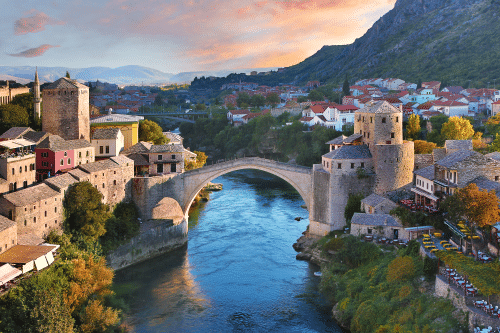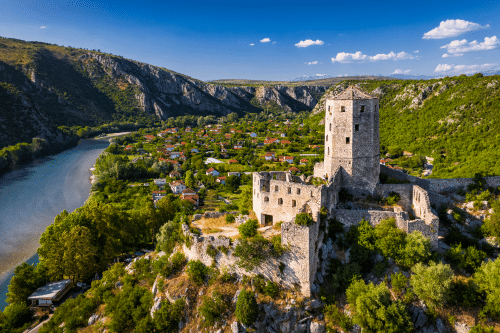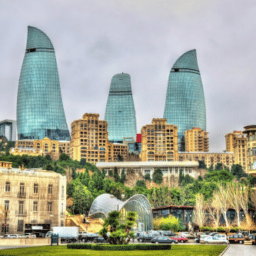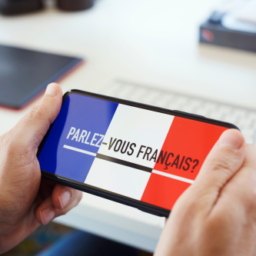

The Federation of Bosnia and Herzegovina (called Bosnia for short) is a multiethnic Balkan country. The most significant groups are Bosniaks, Serbs, and Croats. Their coexistence was not always peaceful. There were many local conflicts, including the three-year civil war at the end of the 20th century.
Nevertheless, the day-to-day coexistence of 3 big ethnic groups and religions (Islam, Orthodoxy, and Catholicism) is calm. This phenomenon influences the linguistic situation of Bosnia and Herzegovina, where users of Bosnian, Serbian, and Croatian live door to door.
Contents
Bosnia in the nutshell
Bosnia and Herzegovina lies south of Croatia, east of Serbia and north of Montenegro. It has been considered an independent country since 1992, after the breakup of Yugoslavia. The state’s area totals 51,197 km²; its large part is covered by the mountains.
Bosnia and Herzegovina’s capital is Sarajevo, known worldwide as a place of attack on prince Franz Ferdinand, archduke of Austria. The most important state institutions are located in the city, such as the office of president Marinko Čavara, the parliamentary assembly, the constitutional court, and the central bank. The Bosnian currency in use is the convertible mark.
The country is a popular travel destination, particularly among Catholics, who make a pilgrimage to the Sanctuary of Medjugorje. Other places worth a visit are Mostar, a city with a famous stone bridge, spectacular Una and Kravica Waterfalls, a dervish monastery in Blagaj, and Jajce, a town with Pliva Waterfall located in the strict centre.
The official language of Bosnia
Bosnia and Herzegovina has 3 official languages: Bosnian, Serbian and Croatian. Due to their similarity, users do not have problems communicating with each other. There are two writing systems used in the country: the Latin alphabet and the Cyrillic script. High schools and universities conduct courses in more than one language, promoting linguistic diversity (source: UNESCO).
Other languages in Bosnia
There are around 17 minority languages in Bosnia and Herzegovina: Montenegrin, Albanian, Slovakian, Bulgarian, Romanian, Hungarian, Yiddish, Macedonian, Slovenian, Polish, Rusyn and Romani among others. Residents of the country are keen to learn foreign languages; the most popular being French, German, Turkish, and English (source: Ling).
In our school, you can learn not only English or Spanish, but also less popular Slavic languages. The Polish, Czech, and Slovak courses take place online or in the classroom. You can take part in particular or group classes – choose the way you prefer.
Bosnian language
The Bosnian language is spoken by approximately 3 million people, mainly Bosniaks. It belongs to the western subgroup of South Slavic languages. Some linguists do not treat Bosnian as a separate language, but rather as a variation of Serbo-Croatian. It may be written both in Latin and Cyrillic script.
The name of the Bosnian language has been adopted quite recently, in 1995. There is a theory of its medieval origin among local linguists. The process of language codification started in the 90s, when the first dictionary and grammar manual were published.



Serbian and Croatian in Bosnia
In Bosnia, there are around a million Serbian speakers. The language uses Cyrillic script. The most popular language variation is Shtokavian, from which Bosnian later originated (source: Ling). Croatian is popular in Bosnia, particularly among Croats. There are around 600 thousand representatives of this ethnic group living in the country (source: croatia.eu).
Basic phrases in Bosnian
Combine pleasant with useful and learn some basic phrases in Bosnian. They sound similar in Croatian and Serbian, so, once learned, will be useful in many regions of the Balkan Peninsula.
- Dobro jutro – Good morning
- Dobar dan – Good afternoon
- Dobro veče – Good evening
- Zdravo – Hello
- Doviđenja – Goodbye
- Vidimo se kasnije – See you soon
- Laku noc – Good night
- Molim – Please
- Hvala – Thank you
- Nema na čemu – You are welcome
- Dobrodošli – Welcome
- Da – Yes
- Ne – No
- Možda – Maybe
- Izvinite – Excuse me
- Žao mi je – I am sorry
- Kako ste?/ Kako si? – How are you?
- Dobro – Good
- Kako se zovete?/ Kako se zoveš? – What is your name?
- Zovem se … / Ime mi je … – My name is …
- Drago mi je! – Nice to meet you!
- Odakle ste?/ Odakle si? – Where are you from?
- Dolazim … – I am from …
- Govorite li engleski? – Do you speak English?
- Govorim (Ne govorim). – I speak (I do not speak).
- Razumijem (Ne razumijem). – I understand (I do not understand).
Bosnian, Serbian, and Croatian – differences
In conclusion, we will show some words that sound differently in the 3 languages. The vocabulary in Bosnian is marked by B, Serbian – S, and Croatian – C.
- January – januar (B and S) / siječanj (C)
- Carrot – mrkva (C and B) / šargarepa (B and S)
- Trousers – hlače (C and B) / pantalone (B and S)
- Library – knjižnica (C) / biblioteka (B and S)
- Factory – tvornica (C and B) / fabrika (B and S)
- Train – vlak (C i B) / voz (B and S)
Among our team, you will find translators of Bosnian, Serbian, Croatian and many other languages. So, if you need to translate various multilingual documents, you can outsource them all. As your satisfaction is important to us, we delegate the jobs to the best specialists in a given field. Check out how our clients rated us.















